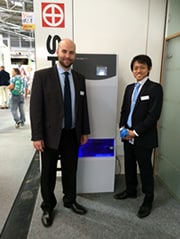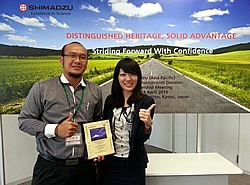Developing Human Resources
We believe it is important to develop employee characteristics and capabilities such as a desire to take on challenges, exceptional expertise, innovativeness, ability to work cooperatively with partners, self-discipline, and teamwork. In particular, we are strengthening measures in three areas-developing business leaders that can drive business activities as a leader of an organization, expanding/improving skill improvement programs that increase the expertise of employees, and developing global human resources able to work together with partners around the world.
Training System
Training personnel strengthens our managerial resources. In an effort to develop ideal employee characteristics, Shimadzu develops personnel through various training, such as level-specific training, function-specific training for respective job types, and selective training to develop business leaders of tomorrow. For new employees, a mentor system is used to ensure each workplace takes responsibility in training new employees after they are assigned to their respective jobs. To strengthen Group management, training is also provided for Group companies whenever necessary.
In addition to offering help with self-directed learning using welfare benefits, a temporary monetary incentive program is available for training to obtain important qualifications. This program is intended to contribute to the growth and progress of corporate results by encouraging a culture of self-development. It provides a lump-sum payment to employees obtaining and using qualifications important for Shimadzu business operations.

New Employee Training
Average training cost per employee(Non-consolidated \121,000/year, Consolidated \47,000 /year)
*Fiscal Year ended March 2023
Developing Business Leaders
The "management training classes" has been held annually since 2015 with the aim of fostering executive management candidates, and 98 employees have participated so far. Based on case studies, participants learn the business literacy and decision-making skills required by executives. They also develop a management vision for Shimadzu based on individual research of companies, and challenges at Shimadzu.
We also continuously train leaders for organizations at Group companies. We have conducted manager training at the Head Of¬fice for Group companies in Japan since 2005 and for Group companies outside Japan since 2015.
Expanding/Improving Skills Training Programs
Shimadzu offers three types of skills training programs-programs to improve interpersonal communication for work or leadership, programs to improve work skills, such as machinery design or English language skills, and programs to improve business skills, such as problem-solving or marketing.
Of those, interpersonal skills training programs are mainly categorized by organizational hierarchy level, such as new employees or managers.
Work skills training programs are categorized by job type, such as R&D or sales, and improve employee skills through on-the-job training.
Since 2018, to offer business skills training opportunities to more employees, an e-Learning system was introduced in 2017 to newly offer open-type marketing skills training and also offer a broad range of other self-improvement classes for relevant skills, such as problem-solving.
Global Manager Training
Shimadzu provides global manager training for managers of overseas Group companies.
In addition to developing a deeper understanding of Shimadzu's history and business operations, the purpose of the training is to foster a sense of being a leader and teach management skills that will be useful in the workplace, such as communication that increases the motivation of subordinates. The first training session in 2015 included 19 participants from eight countries.
Responses from the managers that participated included "I learned about Shimadzu's history and globalization" and "It gave me an opportunity to become acquainted with other managers from various other countries and expand the network of contacts."
Overseas On-Site Training for Young Employees
Shimadzu offers an overseas on-site training program that stations young employees, that have worked at Shimadzu for about five years, at overseas business operations for up to two years. By providing experience of living in a different culture and working with other people that may have diverse senses of value, the purpose of the training program is to develop human resources with better communication skills, including language abilities, a sense of local business expertise, and the ability to drive our business operations toward further globalization.
Participants are selected based on their desire to succeed in overseas business and demonstrated ability to perform their current work. As of the end of September 2017, 37 participants (including 11 women) are currently enrolled in the program and stationed in countries in Asia, North America, Europe and Middle East.
My Experience Working in Europe
I recently returned from training at Shimadzu Europa GmbH (Germany), Shimadzu's subsidiary that coordinates Shimadzu's business operations in Europe. Training was conducted in a very interesting environment. English was the official language used for the training, but Germans spoke German to each other and only German was understood in many locations we went to in town, but there were many Asians around, too. German colleagues tended to prefer determining actions based on a consideration of time-efficiency, so working with them taught me to think about how to better use and prioritize my time. However, I often felt that no matter how advanced technology becomes, there is still nothing better than exchanging information face-to-face. This opportunity to work in Europe with so many people from a wide variety of language and cultural backgrounds has given me an invaluable experience of building good relationships of trust through an exchange of our respective views.

Yoshio Ikezawa
My Experience Working in Singapore
My two years of on-site training in Singapore has served as a major source of personal development. Assigned to the huge ASEAN-India-South Asia region, my days were filled with busily flying here and there. Given the large differences in culture and customs of each country, I initially struggled to adapt. Learn to understand and respect the culture and customs of each country. That advice seemed easy enough, but actually was very difficult to do and taught me a lot.
The world is like a big sumo ring where, given sufficient desire, anyone can raise their hand for a chance to wrestle with challenges throughout the world, regardless of whether you are a man or woman, for example. Based on that experience, I am still working on a variety of assignments that contribute to international business.

Mamiko Okura
Human resource evaluation
SHIMADZU has introduced three human resource evaluation systems: the "target management system" that leads to achievement of business results and improvement of skills; the "personnel evaluation system" that leads to fair treatment by evaluating performance and behavior; and the "self-report system" that leads to mid- to long-term career development.
For example, in the "target management system", every six months, all full-time workers are given opportunities to meet with their superiors to receive feedback on performance reviews and improvements that will be made in the future. In addition, the "self-report system" provides opportunities once a year for each employee to discuss their medium- and long-term career plans.


